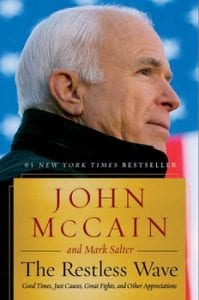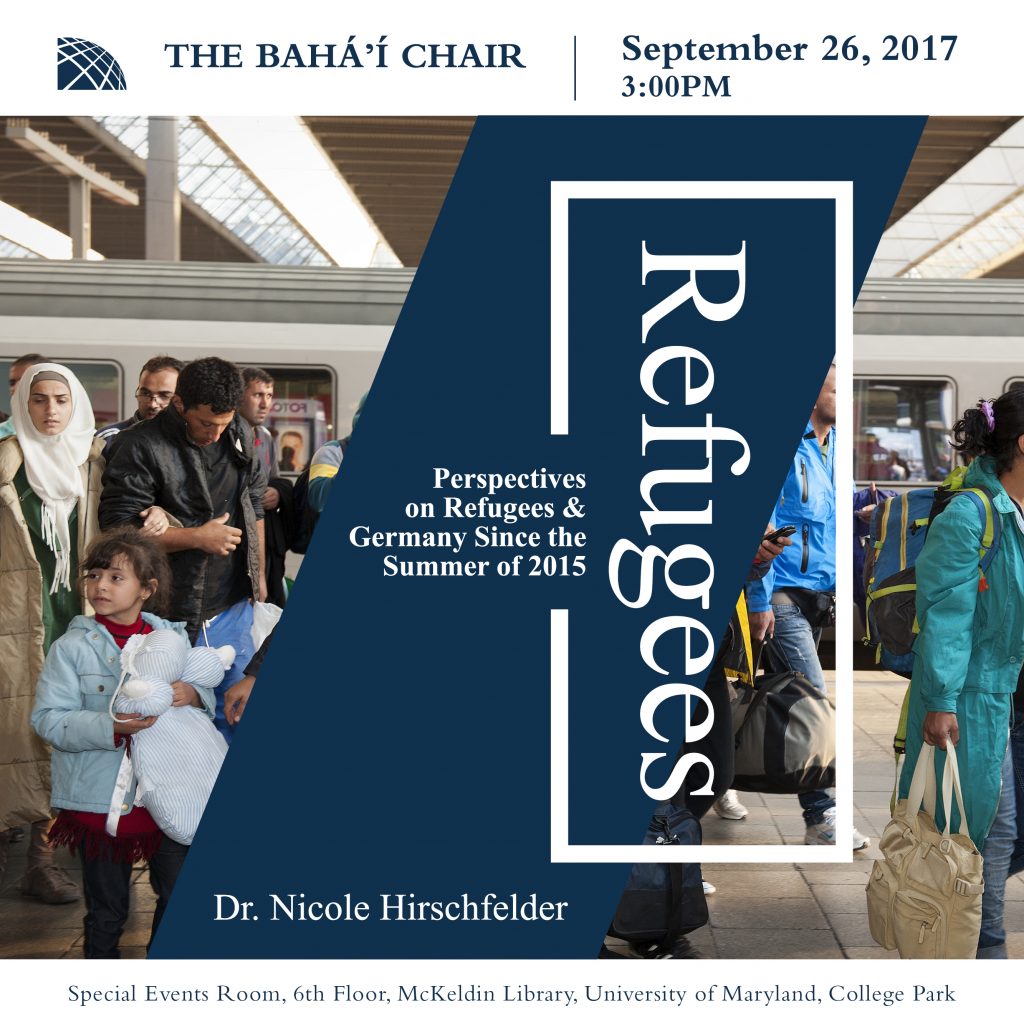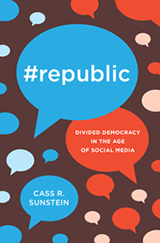This is a reflection written by Esther Kaufman, Masters Student in Economics at the Katholieke Universiteit Leuven, for the new series from The Bahá’í Chair for World Peace on Learning During the Covid-19 Pandemic. Continue reading
A Reflection on Empowerment of Women and Peace
The following piece is a reflection written by our Baha’i Chair Student Intern, Sara Rissanen. This piece discusses Empowerment of Women and Peace, one of the five central themes of the Baha’i Chair for World Peace. Continue reading
Statement on Policing and Racism in America – Professor Hoda Mahmoudi
Policing and Racism
On June 8, 2020, Hoda Mahmoudi, Research Professor and Chair, The Bahá’ì Chair for World Peace gave a statement at the opening of the town hall meeting on Policing and Racism in America. The town hall was sponsored by the College of Behavioral and Social Sciences, University of Maryland, College Park. Continue reading
The Other Epidemic: Human Rights Abuse and Dehumanization – Professor Alison Brysk
This is a reflection written by Professor Alison Brysk, Duncan and Suzanne Mellichamp Professor of Global Governance at the University of California, Santa Barbara, for the new series from The Bahá’í Chair for World Peace on Learning During the Covid-19 Pandemic.
Upcoming Virtual Event: Policing and Racism in America
Upcoming Virtual Event: Policing and Racism in America
Monday, June 8, 2020
4:00 pm – 5:30 pm
ZOOM link will be provided after registration – you can register using the link at the bottom of this page. Continue reading
Statement of Solidarity
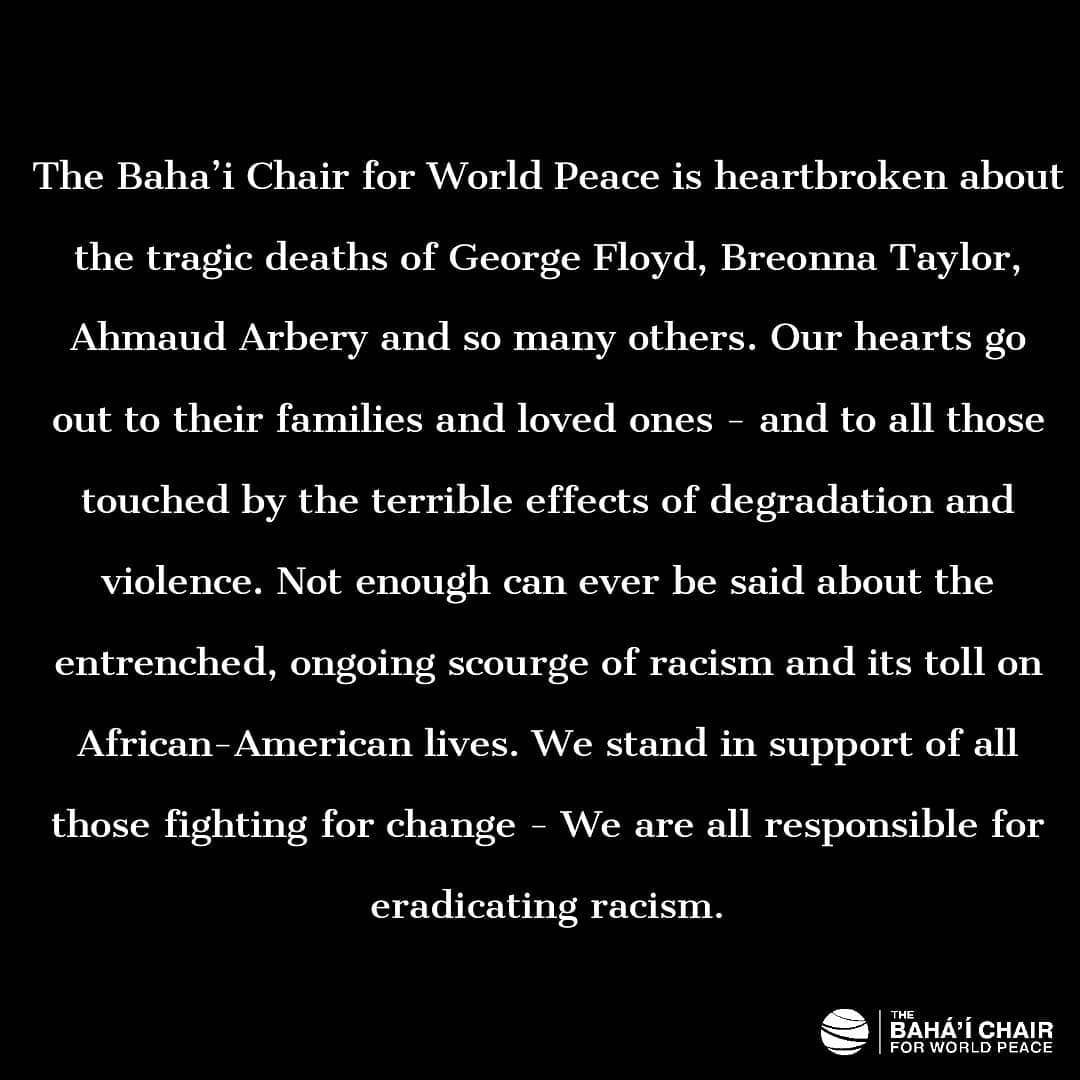
A Reflection on Human Nature
The following piece is a reflection written by our Baha’i Chair Student Intern, Sara Rissanen. This piece discusses Human Nature, one of the five central themes of the Baha’i Chair for World Peace. Continue reading
Moving out under COVIDs shadow – Tactical Urbanism and Being Partisan – Dr. Melissa Nursey Bray
This is a reflection written by Dr. Melissa Nursey Bray, Associate Professor at the Department of Geography, Environment and Population, Faculty of Arts, University of Adelaide, South Australia, for the new series from The Bahá’í Chair for World Peace on Learning During the Covid-19 Pandemic.
A Reflection on Structural Racism and The Root Cause of Prejudice
The following piece is a reflection written by our Baha’i Chair Student Intern, Sara Rissanen. This piece discusses Structural Racism and The Root Cause of Prejudice, the first of the five central themes of the Baha’i Chair for World Peace. Continue reading
Quarantine and Solitary Confinement – Mahvash Sabet
This is a reflection written by Mahvash Sabet, poet poet, psychology teacher, and member of the Baha’i Yaran for the new series from The Bahá’í Chair for World Peace on Learning During the Covid-19 Pandemic.
For Mahvash Sabet – poet, psychology teacher, and member of the Baha’i Yaran – who experienced severe solitary confinement during a ten year sentence in the prisons of Iran, there is a certain irony in now being confined with all her compatriots, outside their walls as a result of the current epidemic. But although the two experiences can hardly be compared, her insights might resonate with readers at this time.
This piece has been adapted and shortened from the original Persian, courtesy of the on-line magazine “aaSoo” (https://www.aasoo.org.)
Fall 2020 Events Update
As we are continuing to monitor the ongoing Covid-19 situation and adapting as necessary, we have made the decision to host all of our events during the fall semester online only.
This allows us to move forward with our planning in a time of uncertainty, whilst also ensuring the safety of our wider community. We will share the information for the virtual events as we finalize the logistics. The details and login information will be available on our website and on our social media accounts. Continue reading
Pandemics, Borders and Crisis in a Globalized World – Professor Simon Dalby
This is a reflection written by Professor Simon Dalby for the new series from The Bahá’í Chair for World Peace on Learning During the Covid-19 Pandemic.
This post was originally published by the Balsillie School of International Affairs and the original post can be viewed here. Continue reading
The Octopus in the Parking Garage
This is an insight written by Grace Powers on the recent Bahá’ì Chair for World Peace Virtual Conference – Global Climate Crisis: Seeking Solutions – held on April 14, 2020. Continue reading
Centered Around a Common Purpose – Dr. Nasim Ahmadiyeh M.D., Ph.D
This is a reflection written by Dr. Nasim Ahmadiyeh M.D., Ph.D for the new series from The Bahá’í Chair for World Peace on Learning During the Covid-19 Pandemic.
There is no cure for one infected with the 2019 novel coronavirus which can cause the disease commonly known as COVID-19. All we can do is wait it out, support the body and hope the immune system can fight the virus and survive its scourge. Ironically, or perhaps poetically, what is needed to fight the virus in one body, can lend insight into what is needed to fight the virus globally.
Getting to Know the Default Male
Below is an article written by Dr. Tiffani Razavi, Visiting Research Professor at The Bahá’ì Chair for World Peace.
This article first appeared in The International Educator, Vol. 34 No. 4 April 2020.
Learning from the Current Crisis – Professor Peter N. Stearns
This is a reflection written by Professor Peter N. Stearns for the new series from The Bahá’í Chair for World Peace on Learning During the Covid-19 Pandemic.
The suffering and dislocation caused by the recent pandemic legitimately provoke all sorts of thoughts, including many constructive suggestions about how we can build on short term response to construct a better society and, more specifically, seek to prepare better for similar crises in the future. I certainly hope some good can indeed emerge. Continue reading
Insight: Don’t Forget the Frog
This is an insight written by Dr. Tiffani Razavi on the recent Bahá’ì Chair for World Peace Virtual Conference – Global Climate Crisis: Seeking Solutions – held on April 14, 2020.
Learning During The Covid-19 Pandemic: A Reflection Series From The Bahá’í Chair for World Peace
Once again, we find ourselves in a crisis that is global in nature.
The Coronavirus outbreak is the great tragedy of our era. The pandemic has disrupted virtually every aspect of the systems that hold up our global and local society. Sadly, we do not seem to have in place what could help us to overcome this crisis. Continue reading
Insight: Global Climate Crisis: Seeking Solutions
This is an insight written by Sara Rissanen on the recent Bahá’í Chair for World Peace Conference, “Global Climate Crisis: Seeking Solutions” held on April 14, 2020. Continue reading
The Bahá’í Chair for World Peace hosts successful virtual conference Global Climate Crisis: Seeking Solutions
The world was a different place a number of months ago when the Baha’i Chair began the process of organizing our recent virtual conference. Long before the advent of the Covid-19, we planned to offer our conference virtually – the better to highlight the global, diffuse nature of environmental challenges. Sadly, these same challenges are paralleled in our coronavirus crisis – offering both hope for what we can accomplish and warnings of our essential unpreparedness. Continue reading
Virtual Conference Information and Schedule: Global Climate Crisis
Global Climate Crisis: Seeking Solutions
Virtual Conference
Tuesday April 14th, 2020
9am – 6pm
To join the conference use the following:
Virtual Conference Link: tinyurl.com/global-climate
Access Password: global2020
Learn more about the speakers and topics included in the Bahá’í Chair’s upcoming Virtual Climate Change Conference.
Upcoming Virtual Conference: Global Climate Crisis: Seeking Solutions
Tuesday, April 14th, 2020 9am – 6pm
Virtual Conference Link: tinyurl.com/global-climate
Access Password: global2020 Continue reading
Supporting Our Communities
boutWe at the Baha’i Chair for World Peace are deeply concerned about the evolving global health crisis and its impact on people everywhere. We mourn the loss of so many lives and our hearts go out to those who have lost loved ones.
This crisis is a reminder that our compassion, good will, and endurance are the characteristics that help us to pull through the most difficult of circumstances. It is also a reminder of how we as a people are closely interconnected with others in every corner of the world. Continue reading
Insight: The Immigration Officers Are Always Around
This is an insight written by Jackson Devadas on the recent Bahá’í Chair for World Peace Lecture, “The Immigration Officers Are Always Around!” held at the University of Maryland on February 25, 2020. Continue reading
Insight: Discarding Hate
This is an insight written by Andrea Orpia on the recent Bahá’í Chair for World Peace Lecture, Discarding Hate held at the University of Maryland on February 4, 2020. Continue reading
Upcoming Event: Life After the Gunshot: A Digital Storytelling Project on the Impact of Structural and Interpersonal Violence and the Healing Process for Young Black Men
Baha’i Chair for World Peace
Professor Joseph Richardson Jr.
Life After the Gunshot: A Digital Storytelling Project on the Impact of Structural and Interpersonal Violence and the Healing Process for Young Black Men
Monday, April 6th, 2020
2:00pm-3:30pm
Prince George’s Room, Stamp Student Union, University of Maryland, College Park Continue reading
Insight: Discarding Hate
This is an insight written by Sara Rissanen on the recent Bahá’í Chair for World Peace Lecture, Discarding Hate held at the University of Maryland on February 4, 2020. Continue reading
My One Voice: Introducing Sara, a Bahá’í Chair Intern
The following piece is written by Sara Rissanen, the Bahá’í Chair’s newest Intern and Marketing Specialist.
Welcome Back to Campus!
The Bahá’í Chair for World Peace wants to welcome all of our UMD students back to campus for the spring semester! We have an exciting semester planned and want to invite you visit our office to learn more about how the Bahá’í Chair works to advance an integrative approach to world peace. We also invite you to attend our events this semester to participate in the conversation of building global peace. Continue reading
Insight: Man Up? Toxic Masculinities and the Health of Women and Children
This is an insight written by Kathryn Obisesan on the recent Bahá’í Chair for World Peace Lecture, Man Up? Toxic Masculinities and the Health of Men, Women, and Children held at the University of Maryland on November 12th, 2019. Continue reading
Insight: Even a Moonshot Needs a Flight Plan
This is an insight written by Kathryn Obisesan on the recent Bahá’í Chair for World Peace Annual Lecture, Even a Moonshot Needs a Flight Plan: Genetics and Ethics in the Obama Administration, held at the University of Maryland on October 10th, 2019. Continue reading
Upcoming Event: Environmental Racism and Slavery in 21st Century Jim Crow America: Stories of Resistance, Hope, and Change
Baha’i Chair for World Peace
Professor Sacoby Wilson
Environmental Racism and Slavery in 21st Century Jim Crow America: Stories of Resistance, Hope, and Change
Thursday, October 24, 2019
12:30pm-2:00pm
Atrium, Stamp Student Union, University of Maryland College Park Continue reading
Insight: Women in the World
This is an insight written by Kathryn Obisesan on the recent Bahá’í Chair for World Peace Conference, Women in the World: Time for a New Paradigm for Peace, held at the University of Maryland on September 24 and 25, 2019. Continue reading
Upcoming Event: Bahá’í Chair for World Peace Annual Lecture 2019
Baha’i Chair for World Peace Annual Lecture 2019
Professor Alondra Nelson
Even a Moon Shot Needs a Flight Plan: Genetics and Ethics in the Obama Administration
October 10, 2019
8:00PM
Colony Ballroom, Stamp Student Union, University of Maryland College Park Continue reading
Upcoming Event: Women in the World: Time for a New Paradigm for Peace
Women in the World: Time for a New Paradigm for Peace
Date:
Wednesday, September 24, – Thursday, September 25, 2019
Location:
University of Maryland, College Park
Colony Ballroom
3972 Campus Dr, College Park, MD 20742, USA Continue reading
Welcome to Campus!
 The Bahá’í Chair for World Peace is delighted to welcome all new and returning students to campus. We have a very exciting year planned and invite you to stop by our office to learn more about us and our program’s focus on advancing interdisciplinary discourse on global peace. Continue reading
The Bahá’í Chair for World Peace is delighted to welcome all new and returning students to campus. We have a very exciting year planned and invite you to stop by our office to learn more about us and our program’s focus on advancing interdisciplinary discourse on global peace. Continue reading
Building Bridges on Maryland Day
“How can we bridge divides in our community?”
It’s a question both straightforward and complicated. Written at the top of a board we displayed, it was the query we asked passersby to answer on Maryland Day–a day when thousands of people come to campus to explore the university’s programs and activities. Participants wrote their responses on a notecard, and over the course of the day, we built a two-dimensional bridge out of their answers.
Insight: The Impact of Global Economic Governance on Low and Mid-income Countries
This is an insight written by Erin Rao on the recent Bahá’í Chair for World Peace panel on The Impact of Global Economic Governance on Low and Mid-income Countries, co-sponsored by the College of Behavioral and Social Science on April 9, 2019.
Insight: The Impact of Global Economic Governance on Low and Mid-income Countries
This is an insight written by Jack Schurman on the recent Bahá’í Chair for World Peace panel on The Impact of Global Economic Governance on Low and Mid-income Countries, co-sponsored by the College of Behavioral and Social Science on April 9, 2019.
Insight: Infrastructure and Happiness
This is an insight written by Jack Schurman on the recent Bahá’í Chair for World Peace conference on Infrastructure and Happiness, co-sponsored with United World Infrastructure and the College of Behavioral and Social Science on April 4-5, 2019
Insight: Infrastructure and Happiness
This is an insight written by Molly Rogers on the recent Bahá’í Chair for World Peace conference on Infrastructure and Happiness, co-sponsored with United World Infrastructure and the College of Behavioral and Social Science on April 4-5, 2019.
Book Review: A Nation of Immigrants
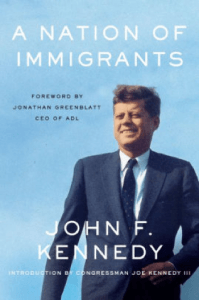
This is a book review of “A Nation of Immigrants” by John F. Kennedy. The review was written by Sharath Patil.
These States are the amplest poem,
Here is not merely a nation but
A teeming Nation of nations.”
-Walt Whitman[1]
In 2018, Congressman Joe Kennedy III (D-MA), re-published a classic by his great-uncle, former U.S. President John F. Kennedy: A Nation of Immigrants. Although the book has been widely celebrated for decades, Joe Kennedy intended to demonstrate the relevance of JFK’s principles and values to debates around immigration policy today. As the first Roman Catholic U.S. president, Kennedy’s election was a critical milestone in this nation’s path to becoming a more inclusive country. Throughout his presidency, Kennedy did not forget his own immigrant roots nor that of most Americans. Irish by heritage, Kennedy wrote with great respect for the suffering that so many Irish immigrants to the United States endured – particularly during the Irish potato famine and under British rule.
Insight – Black Girl Labor as Magic: Toward an Understanding of Digital Black Feminism
This is an insight written by Jack Schurman on the recent Bahá’í Chair for World Peace lecture by Dr. Catherine Knight Steele, Black Girl Labor as Magic: Toward an Understanding of Digital Black Feminism, co-sponsored with The Critical Race Initiative, the College of Arts and Humanities, and the College of Behavioral and Social Science on March 12, 2019. Continue reading
Insight – Black Girl Labor as Magic: Toward an Understanding of Digital Black Feminism
This is an insight written by Angela Yang on the recent Bahá’í Chair for World Peace lecture by Dr. Catherine Knight Steele, Black Girl Labor as Magic: Toward an Understanding of Digital Black Feminism, co-sponsored with The Critical Race Initiative, the College of Arts and Humanities, and the College of Behavioral and Social Science on March 12, 2019.
Insight: Pursuing Equity in Prince George’s County
This is an insight written by Molly Rogers on the recent Bahá’í Chair for World Peace Symposium, Pursuing Equity in Prince George’s County, co-sponsored with The Critical Race Initiative, on February 12, 2019. Continue reading
Belonging and its Implications for Diversity and Inclusion
This is a transcript of a talk given by Professor Hoda Mahmoudi at the opening of the 2019 Diversity and Inclusion Retreat on Belonging: Connections and Challenges. The retreat was hosted by the Office of Undergraduate Studies at the University of Maryland on January 24, 2019 in the Colony Ballroom, Stamp Student Union. Continue reading
Reflection: Vigil and Vigilance for Community Action Against Anti-Semitism
Vigil and Vigilance for Community Action Against Anti-Semitism
This is a reflection by Heather DeMocker on the shooting at the Tree of Life Synagogue in Pittsburgh and the importance of community action for not normalizing hate in America. Continue reading
Insight: Deconstructing Race/Reconstructing Difference
This is an insight written by Heather DeMocker on the Bahá’í Chair for World Peace 2018 Annual Lecture: Deconstructing Race/Reconstructing Difference presented by Professor Jabari Mahiri, University of California Berkeley, on September 20, 2018. Continue reading
Insight: Deconstructing Race/Reconstructing Difference
This is an insight written by Julia Thomas on the Bahá’í Chair for World Peace 2018 Annual Lecture: Deconstructing Race/Reconstructing Difference presented by Professor Jabari Mahiri, University of California Berkeley, on September 20, 2018. Continue reading
UPCOMING EVENT: The Bahá’í Chair for World Peace Annual Lecture
The Bahá’í Chair for World Peace Annual Lecture with Dr. Jabari Mahiri
Book Review: The Restless Wave: Good Times, Just Causes, Great Fights, and Other Appreciations
In the summer of 2018, while battling brain cancer, Arizona Senator John McCain released a book in the midst of a particularly chaotic and toxic political atmosphere. The book, The Restless Wave, serves as a powerful meditation on the future of America as an identity and an ideal; the critical need for compromise and civil discourse; and the need for the propagation of spiritual values such as humility, grace, courage, and justice both among our political leaders and the American people.
McCain’s parting advice cautions against the excesses of partisan entrenchment, righteous and arrogant discourse, and a xenophobic and exclusive definition of America. His principled guidance should be carefully considered by all Americans concerned about the unprecedented and unsettling denigration of truth, unity, civility, and community in our country. Continue reading
Welcome to the new academic year!
Welcome to the new academic year!
The Bahá’í Chair for World Peace is looking forward to another exciting academic year. We invite you to stop by our office and learn more about us and our program’s focus on advancing interdisciplinary discourse on global peace. Continue reading
Recognizing Our Common Humanity: World Refugee Day 2018
i want to go home,
but home is the mouth of a shark
home is the barrel of the gun
and no one would leave home
unless home chased you to the shoreWarsan Shire
Austerity: What is it and why does it matter?
This is a blog post written by Sharath Patil examining the policies of austerity. Continue reading
Insight: Changing the World, One Wall at a Time
This is an insight written by Ashli Taylor on a screening of the film Changing the World, One Wall at a Time, hosted by the Bahá’í Chair for World Peace. Continue reading
Insight: The Ethical Foundations of Human Rights
This is an insight written by Alawi Masud on The Ethical Foundations of Human Rights Conference, hosted by the Bahá’í Chair for World Peace on March 28, 2018. Continue reading
Steady Change: My Time as a Bahá’í Chair Intern
This post was written by Ashli Taylor as reflection on her time as an intern with the Bahá’í Chair for World Peace. Continue reading
A Small Step: Introducing Emily, a Bahá’í Chair for World Peace Intern
This piece was written by Emily Gorey, the Bahá’í Chair for World Peace’s Marketing Specialist. Continue reading
Insight: More Than Just a Pretty Picture
This is an insight written by Grace Russell on a lecture given by Audra Buck-Coleman as part of the Bahá’í Chair series on human nature. Continue reading
Insight: Aggression, Testosterone and the Biological Basis of Behavior
This is an insight written by Alawi Masud on a lecture given by Dr. Gregory F. Ball as part of the Bahá’í Chair series on human nature. Continue reading
Celebrating Inspiring Women, International Women’s Day 2018
Celebrating Inspiring Women
International Women’s Day 2018
International Women’s Day has been observed since the early 1900’s and is a day for celebrating the achievements of women across the globe. To mark the day we asked some of our students to write about women who have inspired them.
Welcome Back to Campus!
The Bahá’í Chair for World Peace is excited to welcome all of you back to campus for the start of the spring semester! We hope everyone is settling in and enjoying the first day of classes.
We look forward to seeing many of you at our upcoming spring lecture series. All the lectures are open to the campus community and the public and are free to attend. These events bring leading thinkers to campus to examine obstacles to global peace, and solutions for overcoming those obstacles.
Insight: Is the Cost of Globalization the Extinction of Ancestral Identities?
This is an insight written by Esther Kaufman on the recent 1oth UN Session of the Forum on Minorities.
Is the cost of globalization the extinction of ancestral identities?
The UN held the 10th session of the Forum on Minorities from the 28th of November to the 1st of December 2017. This conference welcomed organizations from across the world to speak as representatives of their respective minority nations, and to air their concerns to the International community. Continue reading
Insights: Muslims and the Holocaust: Reconciliation and Hope
This is an insight written by Margo Shear on a lecture given by Dr. Mehnaz Afridi as part of the Bahá’í Chair series on human nature.
Perspective on History
The Bahá’í Chair for World Peace recently hosted Dr. Mehnaz Afridi, associate professor of religious studies and director of the Holocaust, Genocide, and Interfaith Education Center at Manhattan College. The subject of her lecture, “Muslims and the Holocaust: Reconciliation and Hope,” drew interest from guests in the hopes of exploring a dark part of history – from a different perspective. Continue reading
Upcoming Event: Muslims and the Holocaust: Reconciliation and Hope
The Bahá’í Chair for World Peace Fall Lecture
Dr. Mehnaz Afridi, Associate Professor of Religious Studies and Director of the Holocaust, Genocide, and Interfaith Education Center at Manhattan College
Muslims and the Holocaust: Reconciliation and Hope
Tuesday October 24th
3pm
Special Events Room, 6th Floor, McKeldin Library, University of Maryland, College Park
Reflection: International Day of the Girl October 11th 2017
Freedom, Freedom, where are you? Cause I need freedom too!
Beyoncé
Upcoming Event: Fear of the Dark: Cultural Myth, Psychological Schema, and Prejudice
The Bahá’í Chair for World Peace Series on Structural Racism and the Root Causes of Prejudice Presents:
Sheri Parks, First Director of the Arts and Humanities Center for Synergy at the University of Maryland
Fear of the Dark: Cultural Myth, Psychological Schema, and Prejudice
Tuesday October 10,2017
3PM
Atrium, Stamp Student Union, University of Maryland, College Park
Insights: The First Political Order
The First Political Order: Sex, Governance and National Security
The turn-out to the Baha’i Chair of World Peace’s First Annual Lecture on Thursday, September 21st was impressive. The audience included University of Maryland students, teachers and deans, as well as amazing visitors from all over the world. There could not have been a better topic addressed in the presence of some of the most significant minds involved with the promotion of international peace.

Professor Hoda Mahmoudi and Professor Valerie Hudson at the Annual Lecture, September 21st 2017.
Upcoming Event: Perspectives on Refugees and Germany since 2015
The Bahá’í Chair Fall Lecture
Nicole Hirschfelder, Associate Professor for American Culture and Literature, Eberhard Karls University of Tübingen, Germany
Tuesday September, 26th, 2017
3:00PM
Special Events Room, 6th Floor, McKeldin Library, University of Maryland, College Park
Reflection: International Day of Peace 2017
“We are a world in pieces. We need to be a world at peace.”
Antonio Guterres, United Nations Secretary General
Today is the International Day of Peace, a day designated by the United Nations General Assembly as a period of non-violence and cease-fire. The theme for 2017 is “Together for Peace: Respect, Safety and Dignity for All.” The day is focused on the TOGETHER campaign launched by the United Nations in September 2016 to promote respect, safety and dignity for refugees and migrants and to counter the rise in xenophobia and discrimination. Continue reading
Upcoming Event: The First Political Order: Sex, Governance, and National Security
The Bahá’í Chair for World Peace Annual Lecture
Valerie M. Hudson, Professor and George H.W. Bush Chair in the Bush School of Government at Texas A&M University
September 21st 2017
7pm
Atrium, Stamp Student Union, University of Maryland, College Park, MD.
Reflection: Do Ethics have a Place in Capitalism?
Do Ethics have a Place in Capitalism?
Is capitalism the best ideology for society? As the income gap between the rich and poor grows nationally and global inequality persists, it would be beneficial to reflect on what values drive the system.
Both critiques and advocates of the capitalist system—an economic model driven by the free market and operates outside of state control— rely on the field of economics to shape their arguments. This field of study has always played an important role in understanding human behavior and specifically the interaction between humans and their society. Continue reading
A Warm Welcome to Campus
The Bahá’í Chair for World Peace is very excited to welcome all of the new, and returning students, back to campus for the start of the fall semester! We hope everyone is settling in and enjoying the first day of classes.
We look forward to seeing many of you at our upcoming fall lecture series. All the lectures are open to the campus community and the public and are free to attend. These events bring leading thinkers to campus to examine obstacles to global peace, and solutions for overcoming those obstacles. Continue reading
Book Review: The History of Humankind
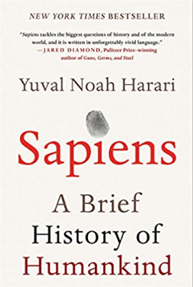 Yuval Noah Harari’s, Sapiens: A Brief History of Humankind, is an exceedingly unique and captivating read primarily because of its brevity. In a mere 400 pages, Israeli historian Harari presents and analyzes over 50,000 years of human history. Continue reading
Yuval Noah Harari’s, Sapiens: A Brief History of Humankind, is an exceedingly unique and captivating read primarily because of its brevity. In a mere 400 pages, Israeli historian Harari presents and analyzes over 50,000 years of human history. Continue reading
Book Review: Searching for Meaning
It’s hard to remember that our lives are such a short time. It’s hard to remember when it takes such a long time.” – Isaac Brock
Insights: The Future of Virtual Reality
The Future of Virtual Reality
This is an insight written by Esther Kaufman on an event cosponsored by The Bahá’í Chair for World Peace and organized by the Future of Information Alliance on June 6, 2017 at the Phillips Collection. Continue reading
Insights: Cass Sunstein on The #Republic
This is an insight written by Esther Kaufman on a lecture given by Professor Cass Sunstein, at the American Enterprise Institute on April 14th 2017. Professor Sunstein is a scholar of law and behavioral economics, and he spoke about his new book #Republic: Divided Democracy in the Age of Social Media.
Book Review: The Book of Joy
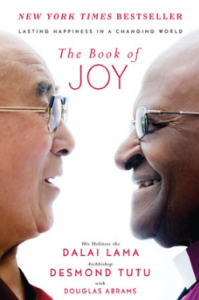
Great Minds
Eleanor Roosevelt encouraged people to hold elevated conversations. She once said that “great minds discuss ideas; average minds discuss events; and small minds discuss people.” I have not heard a more elevated conversation than the week-long discussion between the Dalai Lama and Archbishop Desmond Tutu documented in vivid detail in The Book of Joy by Douglas Abrams. Continue reading
Upcoming Event: Finding Justice in the Cambodian Genocide
The Department of Government and Politics, College Park Scholars, International Studies,
and The Bahá’í Chair for World Peace
Present a Lecture
Finding Justice in the Cambodian Genocide: Mistakes, Consequences, and Questionable Ethics
Youk Chhang, Executive Director of the Documentation Center of Cambodia (DC-Cam), founder of Sleuk Rith Institute
2.00PM, May 9, 2017, Special Events Room, McKeldin Library, University of Maryland, College Park
Continue reading
Upcoming Event: Maryland Day 2017
Stop by and say hello to the Bahá’í Chair for World Peace at Maryland Day 2017. Continue reading
Insights: Trying to Understand the 2016 Elections
This is an insight written by Julia Thomas on the symposium given by Dr. Matthew Hughey and Dr. Paula Ioanide as part of the Bahá’í Chair for World Peace series on Structural Racism. Continue reading
Conversation: Gender Equality on Campus
Gender Equality on Campus
In this conversation, Professor Mahmoudi and a wonderful group of students discuss the challenge of gender equality on campus. Continue reading
Feminism: What It Means To Six UMD Students.
Feminism: What It Means To Six UMD Students
In recognition and celebration of International Women’s Day, March 8th 2017, we asked some of our student contributors what feminism means to them. Continue reading
Insights: Preventing Youth Violence: From Research to Action
This is an insight written by Esther Kaufman on the lecture given by Dr. Valerie Maholmes and Dr. Lauren Abramson as part of the Bahá’í Chair for World Peace series on Structural Racism.
Preventing Youth Violence: From Research to Action
Upcoming Event: Symposium on Structural Racism and Youth Violence
Dr. Valerie Maholmes, NICHD
Dr Lauren Abramson, Community Conferencing Center
Symposium on Structural Racism and Youth Violence
March 1st 2017, 4pm – 6pm, Atrium 1107, Stamp Student Union
Co-sponsored by the Critical Race Initiative Continue reading
Insights: Non-violence as an effective strategy?
This is an insight written by Esther Kaufman on the lecture given by Professor Kathleen Cunningham as part of the Bahá’í Chair for World Peace series on Leadership and Global Governance.
Non-violence as an influential strategy?
Professor Kathleen Gallagher’s lecture on self-determination of nationalistic organizations offers insightful and relevant evidence on moving towards a peaceful society. Groups seeking self-determination have been known to have high internal fragmentation that is associated with the use of violence in pursuit of political recognition. Continue reading
Interview: Professor Kathleen Cunningham
Interview with Professor Kathleen Cunningham, interview conducted by Dr. Kate Seaman.
Professor Cunningham will be giving a lecture on the 15th of February in the Special Events Room, 6th Floor, McKeldin Library, University of Marlyand. To find out more and to RSVP visit the website of the Bahá’í Chair for World Peace. Continue reading
Conversation: Bridging Divides
Bridging Divides on Campus
As students are returning for the spring semester, we at the Bahá’í Chair would like to warmly welcome you back to campus. Continue reading
Book Review: A Book for Our Times
A Book for Our Times
The white working class – this demographic group claimed center stage in American political discourse over the past year. I often see them dismissed as backwards, uneducated conservatives. Alternatively, we offer trite solutions for their plight without fully comprehending the problem. Continue reading
Upcoming Event: Secessionism, Violence and Nonviolence
Dr. Kathleen Cunningham, Department of Government and Politics, University of Maryland College Park
Secessionism, Violence and Nonviolence
February 15th, 2017, Special Events Room, McKeldin Library, University of Maryland, College Park Continue reading
Reflection: The Poorest Country in the Western Hemisphere?
Reflection: “The Poorest Country in the Western Hemisphere”
Proud Beginnings
In many ways, the new world’s first free country was not the United States, where much of the population was enslaved. The first free country was Haiti, roughly the size of Maryland and located in the Caribbean, at its peak Haiti was the most prosperous colony in the world which enabled France, and other Western nations, to acquire wealth at the expense of its own development. Continue reading
Insights: Are we asking the right questions?
Can Women Think?
When Dr. des Bouvrie prefaced her lecture with the question, “Can women think?” the entire audience looked around with faces of confusion and some with disdain. It seemed rather preposterous that a woman would be questioning if she or any other woman has the ability to think. Continue reading
Insights: Searching for the Impossible
This is a reflection written by Esther Kaufman on the lecture given by Dr. Nicole des Bouvrie on the 30th of November 2016.
Why We Should Search for the Impossible
What if the question, “Can Women Think?” is not an absurd question? Dr. des Bouvrie began her lecture by introducing historic western philosophers whose ideas have established the foundation of Western thinking. From ancient times, white male philosophers have built identities based on differences. Following their philosophies women cannot think, or at least, not as men do. Continue reading
Reflection: Solving Racism Through Dialogue
The Problem of Prejudice
Once again the stubborn scourge of racial prejudice and structural racism is tearing apart the American society. For almost four-hundred years since slavery was first introduced to the American continent, the pseudo-scientific doctrine of racial superiority, and the structural arrangements that promote the systematic support of racism, continue to persist. Continue reading
Upcoming Event Preview: Can Women Think?
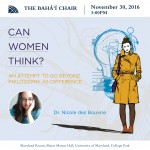
Dr. Nicole des Bouvrie, Visiting Scholar, The Bahá’í Chair for World Peace, University of Maryland, College Park.
November 30th 2016, Maryland Room, Marie Mount Hall, University of Maryland, College Park.
Can Women Think? An Attempt to Go Beyond Philosophy as Difference
Book Review: The Risks of Righteous Fury
Book Review: The Risks of Righteous Fury
This is a book review of The Righteous Mind by Jonathan Haidt. The review was written by Vicky Yu.
Morality and common sense suffer from the same underlying assumptions; we believe that people all abide by the same principles. Experience teaches us that common sense is not universal, but accepting the same verdict on morality is more difficult. Acknowledging differences in how we determine right versus wrong fundamentally alters perceptions of who we are and our place in the world. Continue reading
Upcoming Event: Can Women Think?
Dr. Nicole des Bouvrie, Visiting Scholar, The Bahá’í Chair for World Peace, University of Maryland, College Park.
Can Women Think? An Attempt to Go Beyond Philosophy as Difference Continue reading
Insights: The Power of Patience
This is an insight written by Esther Kaufman on the lecture given by Mrs. May Rihani as part of the Bahá’í Chair for World Peace series on Women and Peace.
The Impact of Examples
Mrs. May Rihani’s lecture, “Sexism, Gender Roles and Their Intersection with Power”, shed light on the broad range of issues surrounding sexism and gender bias around the world. Continue reading
Insights: Racism as a Barrier to Justice
This is a reflection written by Esther Kaufman on the lecture given by Dr. Rashawn Ray as part of the Bahá’ì Chair for World Peace series on Structural Racism.
Racism as a Barrier to Justice
Dr. Rashawn Ray’s emotional presentation on “Why Police Compliance Does Not Save Black Lives” left me feeling a deep sense of disappointment in our society’s failure to recognize and deal with racism. He began his lecture with the juxtaposition of videos and statistics that emphasized the differences between races in police compliance and non-compliance. Continue reading
Book Review: Little Brown Me, and Other Reflections on Identity
Are we as adults prepared to help the children we care about make sense of their own race-related observations?
This is a book review of Why are all the Black Kids Sitting Together in the Cafeteria by Beverly Daniel Tatum. The review was written by Brandie Williams.
In this thought-provoking work, Why are all the Black Kids Sitting Together in the Cafeteria, Beverly Daniel Tatum weaves together a conscious-jolting web of understanding surrounding privilege, racial identity, and how we come to understand who we are as individuals. In the very beginning of her book, she challenges us with a simple exercise: “think back to your earliest race-related memory.”

